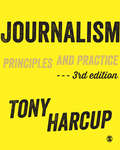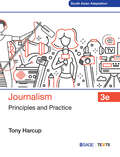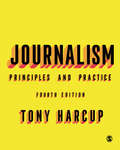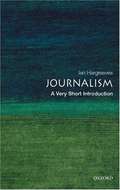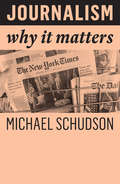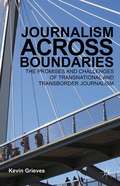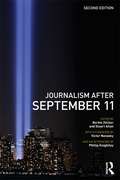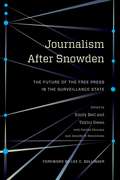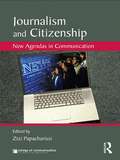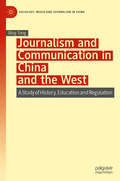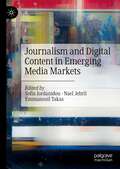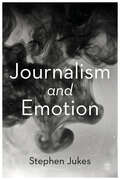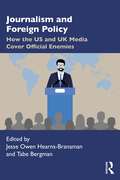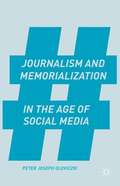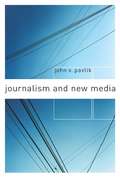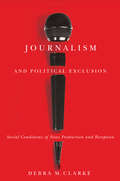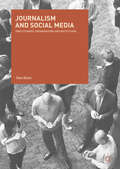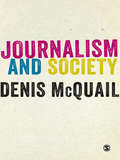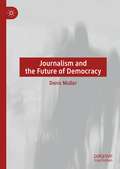- Table View
- List View
Journalism
by Tony HarcupJournalism: Principles & Practice remains the essential textbook for all students of journalism. With each print copy of the new third edition, students receive FREE access to the interactive eBook edition offering on-the-go access to a wealth of digital resources including video tutorials from the author himself! Journalism: Principles and Practice is the must-have guide to everything students need to know about how journalism works. This new edition is fully updated to cover the new essentials: social media, the impact of Twitter, and the need for an ethical approach. This book will equip you with all the skills and savvy you need to become the resourceful yet ethical journalists of the future. New and improved features will help you: Get to grips with the huge impact of social and mobile media on how we gather information and tell stories Grasp the rights and wrongs of journalism with a new chapter on ethics and regulation Learn how to make the most of your skills with tips and advice from digital and other journalists Think through 'what would you do?' in a new feature that takes you into the real world of journalism This new edition retains its innovative two-column structure, stylishly blending theory and practice. As relevant to the newsroom as the seminar room, it is the one book you will need to take you through your degree and into your career as a journalist.
Journalism: Principles and Practice
by Tony HarcupGet 12 months FREE access to an interactive eBook* when you buy the paperback! (Print paperback version only, ISBN 9781446274095) To find out more and for a preview of the new edition visit https://study.sagepub.com/journalism Journalism: Principles & Practice remains the essential textbook for all students of journalism. With each print copy of the new third edition, you receive FREE access to the interactive eBook edition offering on-the-go access to a wealth of digital resources including video tutorials from the author. This book is the must-have guide to everything you need to know about how journalism works. The new edition is fully updated to cover the new essentials: social media, the impact of Twitter, and the need for an ethical approach. This book will equip you with all the skills and savvy you need to become the resourceful yet ethical journalists of the future. New and improved features will help you: Get to grips with the huge impact of social and mobile media on how we gather information and tell stories Grasp the rights and wrongs of journalism with a new chapter on ethics and regulation Learn how to make the most of your skills with tips from journalists such as Cathy Newman and Andrew Norfolk Think through ‘what would you do?' in a new feature that takes you into the real world of journalism at the end of every chapter This new edition retains its innovative two-column structure, stylishly blending theory and practice. As relevant to the newsroom as the seminar room, it is the one book you will need to take you through your degree and into your career as a journalist. *interactivity only available through Vitalsource eBook
Journalism: Principles and Practice
by Tony HarcupGet 12 months FREE access to an interactive eBook* when you buy the paperback! (Print paperback version only, ISBN 9781446274095) To find out more and for a preview of the new edition visit https://study.sagepub.com/journalism Journalism: Principles & Practice remains the essential textbook for all students of journalism. With each print copy of the new third edition, you receive FREE access to the interactive eBook edition offering on-the-go access to a wealth of digital resources including video tutorials from the author. This book is the must-have guide to everything you need to know about how journalism works. The new edition is fully updated to cover the new essentials: social media, the impact of Twitter, and the need for an ethical approach. This book will equip you with all the skills and savvy you need to become the resourceful yet ethical journalists of the future. New and improved features will help you: Get to grips with the huge impact of social and mobile media on how we gather information and tell stories Grasp the rights and wrongs of journalism with a new chapter on ethics and regulation Learn how to make the most of your skills with tips from journalists such as Cathy Newman and Andrew Norfolk Think through ‘what would you do?' in a new feature that takes you into the real world of journalism at the end of every chapter This new edition retains its innovative two-column structure, stylishly blending theory and practice. As relevant to the newsroom as the seminar room, it is the one book you will need to take you through your degree and into your career as a journalist. *interactivity only available through Vitalsource eBook
Journalism: Principles and Practice
by Tony HarcupA textbook that explains the basic concepts of journalism using examples and stories from real life Journalism: Principles and Practice is an essential textbook that tells us about the theory and practice of journalism. This edition covers new topics that are relevant to today's social media, the rights and wrongs of journalism, and digital media among others. It helps the reader to develop the necessary skills to become a modern ethical journalist. The book gives a complete introduction to the fundamental concepts of journalism through entertaining stories and examples from the newsroom. It will be useful to students who are beginning to explore the world of journalism as well as those seeking to gain a deeper understanding of the basic concepts. Key Features: • Updated with contemporary topics such as social media and new methods of gathering information • Simple and clear explanations of the basic concepts of journalism • Relates theory to the real world through exercises that encourage students to think critically • Contains skills and tips from practicing journalists that help students become industry-ready
Journalism: Principles and Practice
by Tony Harcup"A classic text of journalism education that goes beyond the basics to ask the questions that anyone thinking of becoming a journalist really needs to consider. An ethical, entertaining and enduring read - highly recommended." - Michelle Stanistreet, General Secretary, National Union of Journalists This is the one book you need to guide you through university and into your career in journalism. It features stories and tips from a diverse range of journalists, including Ayshah Tull and Cathy Newman of Channel 4 News; Emma Youle of HuffPost; Andrew Norfolk of the Times; and the Mirror’s Nada Farhoud. Covering everything from print to podcasting, it will equip you with the skills and understanding you need to become a successful and ethical journalist. Tony Harcup’s Journalism: Principles and Practice is simply the best guide there is to studying and practising journalism today. "A holistic assessment of what journalism is all about, with plenty of enterprising interpretations of our trade - a word I prefer to ′profession′. I never met a more ′unprofessional′ breed than that of my fellow hacks. This book will, I hope, lead our successors both to question and rebel more than we have." - Jon Snow, Channel 4 News
Journalism: Principles and Practice
by Tony Harcup"A classic text of journalism education that goes beyond the basics to ask the questions that anyone thinking of becoming a journalist really needs to consider. An ethical, entertaining and enduring read - highly recommended." - Michelle Stanistreet, General Secretary, National Union of Journalists This is the one book you need to guide you through university and into your career in journalism. It features stories and tips from a diverse range of journalists, including Ayshah Tull and Cathy Newman of Channel 4 News; Emma Youle of HuffPost; Andrew Norfolk of the Times; and the Mirror’s Nada Farhoud. Covering everything from print to podcasting, it will equip you with the skills and understanding you need to become a successful and ethical journalist. Tony Harcup’s Journalism: Principles and Practice is simply the best guide there is to studying and practising journalism today. "A holistic assessment of what journalism is all about, with plenty of enterprising interpretations of our trade - a word I prefer to ′profession′. I never met a more ′unprofessional′ breed than that of my fellow hacks. This book will, I hope, lead our successors both to question and rebel more than we have." - Jon Snow, Channel 4 News
Journalism: A Very Short Introduction
by Ian HargreavesAlmost everyone reads the newspaper, browses the Internet, listens to the radio or watches TV. Journalism has an indelible effect on our worldview--from the fight against global terrorism to the American presidential elections, celebrity scandal to the latest environmental coups. Hargreaves uses his unique position within the media to examine how we get this information and the many practical, political and professional decisions that the journalist has to make, as part of the process of delivering that information to us. Is journalism the 'first draft of history' or a dumbing-down of our culture and a glorification of the trivial and intrusive? In this intriguing book Ian Hargreaves argues that the core principles of 'freedom of the press' and the necessity of exposing the truth are as vital today as they ever were.
Journalism: Why It Matters (Why It Matters)
by Michael SchudsonDespite the criticisms that have been leveled at news organizations in recent years and the many difficulties they face, journalism matters. It matters, argues Schudson, because it orients people daily in the complex and changing worlds in which they live. It matters because it offers a fact-centered, documented approach to pertinent public issues. It matters because it keeps watch on the powerful, especially those in government, and can press upon them unpleasant truths to which they must respond. Corruption is stemmed, unwise initiatives stopped, public danger averted because of what journalists do. This book challenges journalists to think hard about what they really do. It challenges skeptical news audiences to be mindful not only of media bias but also of their own biases and how these can distort their perception. And it holds out hope that journalism will be for years to come a path for ambitious, curious young people who love words or pictures or numbers and want to use them to improve the public conversation in familiar ways or in ways yet to be imagined.
Journalism (Handbooks Of Communication Science [hocs] Ser. #19)
by Tim P. VosThis volume sets out the state-of-the-art in the discipline of journalism at a time in which the practice and profession of journalism is in serious flux. While journalism is still anchored to its history, change is infecting the field. The profession, and the scholars who study it, are reconceptualizing what journalism is in a time when journalists no longer monopolize the means for spreading the news. Here, journalism is explored as a social practice, as an institution, and as memory. The roles, epistemologies, and ethics of the field are evolving. With this in mind, the volume revisits classic theories of journalism, such as gatekeeping and agenda-setting, but also opens up new avenues of theorizing by broadening the scope of inquiry into an expanded journalism ecology, which now includes citizen journalism, documentaries, and lifestyle journalism, and by tapping the insights of other disciplines, such as geography, economics, and psychology. The volume is a go-to map of the field for students and scholars-highlighting emerging issues, enduring themes, revitalized theories, and fresh conceptualizations of journalism.
Journalism across Boundaries
by Kevin GrievesJournalistic activity crosses national borders in creative and sometimes unexpected ways. Drawing on many interviews and newsroom observation, this book addresses an overlooked but important aspect of international journalism by examining how journalists carry out their daily work at the transnational and regional transborder level.
Journalism After September 11 (Communication and Society)
by Stuart Allan Barbie ZelizerPraise for the first edition: This collection of essays comes mainly from academics but nobody should bridle at theorists lecturing practitioners. They properly challenge the way September 11th was reported - in a way that's both an endorsement of the role of the media and a wake-up call on its failures . . . anyone interested in our trade should read it.' - Roger Mosey, Ariel'A thoughtful and engaging examination of the effects of 9/11 on the field of journalism. Its unique aim is to discuss the impact of the attack as a personal trauma and its current and future effects on journalism and the reporting of the news. . . highly recommended.' - Library Journal Journalism After September 11 examines how the traumatic attacks of that day continue to transform the nature of journalism, particularly in the United States and Britain. Familiar notions of what it means to be a journalist, how best to practice journalism, and what the public can reasonably expect of journalists in the name of democracy, were shaken to their foundations. Ten years on, however, new questions arise regarding the lasting implications of that tragic day and its aftermath. Bringing together an internationally respected collection of scholars and media commentators, Journalism After September 11 addresses topics such as: journalism and public life at a time of crisis; broadsheet and tabloid newspaper coverage of the attacks; the role of sources in shaping the news; reporting by global news media such as CNN; Western representations of Islam; current affairs broadcasting; news photography and trauma; the emotional well-being of reporters; online journalism; as well as a host of pertinent issues around news, democracy and citizenship. This second edition includes four new chapters – examining Arabic newspaper reporting of the attacks, the perceptions of television audiences, national magazine coverage of the ensuing crisis, and the media politics of ‘othering’ – as well as revised chapters from the first edition and an updated Introduction by the co-editors. A foreword is provided by Victor Navasky and an afterword by Phillip Knightley.
Journalism After Snowden: The Future of the Free Press in the Surveillance State (Columbia Journalism Review Books)
by Emily Bell Taylor OwenEdward Snowden's release of classified NSA documents exposed the widespread government practice of mass surveillance in a democratic society. The publication of these documents, facilitated by three journalists, as well as efforts to criminalize the act of being a whistleblower or source, signaled a new era in the coverage of national security reporting. The contributors to Journalism After Snowden analyze the implications of the Snowden affair for journalism and the future role of the profession as a watchdog for the public good. Integrating discussions of media, law, surveillance, technology, and national security, the book offers a timely and much-needed assessment of the promises and perils for journalism in the digital age.Journalism After Snowden is essential reading for citizens, journalists, and academics in search of perspective on the need for and threats to investigative journalism in an age of heightened surveillance. The book features contributions from key players involved in the reporting of leaks of classified information by Edward Snowden, including Alan Rusbridger, former editor-in-chief of The Guardian; ex-New York Times executive editor Jill Abramson; legal scholar and journalist Glenn Greenwald; and Snowden himself. Other contributors include dean of Columbia Graduate School of Journalism Steve Coll, Internet and society scholar Clay Shirky, legal scholar Cass Sunstein, and journalist Julia Angwin. Topics discussed include protecting sources, digital security practices, the legal rights of journalists, access to classified data, interpreting journalistic privilege in the digital age, and understanding the impact of the Internet and telecommunications policy on journalism. The anthology's interdisciplinary nature provides a comprehensive overview and understanding of how society can protect the press and ensure the free flow of information.
Journalism and Citizenship: New Agendas in Communication (New Agendas in Communication Series)
by Zizi PapacharissiJournalism is in the middle of sweeping changes in its relationships with the communities it serves, and the audiences for news and public affairs it seeks to address. Changes in technology have blurred the lines between professionals and citizens, partisan and objective bystanders, particularly in the emerging public zones of the blogosphere. This volume examines these changes and the new concepts needed to understand them in the days and years ahead. With contributions from up-and-coming scholars, this collection identifies key issues and paves the way for further research on the role of journalism in today's world. It will appeal to scholars, researchers, and advanced students in journalism, communication, and media studies, and will also be of interest to those in public affairs, political science, and government.
Journalism and Communication in China and the West: A Study of History, Education and Regulation (Sociology, Media and Journalism in China)
by Bing TongThis book sheds new light on the study of journalism and communication, considering why and how journalism is studied in the 21st century. It notably offers both an international and interdisciplinary comparison of journalism and communication, examining the history of Chinese and Western journalism and addressing the similarities and differences between them. Focusing on the education and training of future journalists, it also provides a comprehensive study of news coverage systems in China and in Western countries, including the processing of news sources, attitudes towards news communication and comparative communication scholarship. Researchers of media and journalism will find this a key read, as well as practicing journalists and students of journalism.
Journalism and Digital Content in Emerging Media Markets
by Sofia Iordanidou Nael Jebril Emmanouil TakasThis edited book examines key challenges in the digital era and their implications for journalism practice and public debate in emerging media markets. It specifically focuses on evidence from selected Southern and Eastern European countries as they represent cases where media markets face bigger technical and organizational challenges, but still share some similarities with their counterparts in central, western, and northern Europe.
Journalism and Emotion
by Professor Stephen Jukes"Indispensable.... for anyone who cares about journalism." - Professor Karin Wahl-Jorgensen How can we understand the complex relationship between journalism and emotion? In a world of live-streamed terror, polarised political debates and fake news, emotion has become central to our understanding of contemporary journalism. Including interviews with leading journalists throughout, Journalism and Emotion critically explores the impact of this new affective media environment, not just on the practice of journalism, but also the lived experience of journalists themselves. Bringing together theory and practice, Stephen Jukes explores: The history of objectivity and emotion in journalism, from pre-internet to digital. The &‘emotionalisation&’ of culture in today&’s populist media landscape. The blurring of boundaries between journalism and social media content. The professional practices of journalists working with emotive material. The mental health risks to journalists covering traumatic stories. The impact on journalists handling graphic user-generated content. In today&’s interactive, interconnected and participatory media environment, there is more emotive content being produced and shared than ever before. Journalism and Emotion helps you make sense of this, explaining how emotion is mobilised to influence public opinion, and how journalists themselves work with and through emotional material.
Journalism and Emotion
by Professor Stephen Jukes"Indispensable.... for anyone who cares about journalism." - Professor Karin Wahl-Jorgensen How can we understand the complex relationship between journalism and emotion? In a world of live-streamed terror, polarised political debates and fake news, emotion has become central to our understanding of contemporary journalism. Including interviews with leading journalists throughout, Journalism and Emotion critically explores the impact of this new affective media environment, not just on the practice of journalism, but also the lived experience of journalists themselves. Bringing together theory and practice, Stephen Jukes explores: The history of objectivity and emotion in journalism, from pre-internet to digital. The &‘emotionalisation&’ of culture in today&’s populist media landscape. The blurring of boundaries between journalism and social media content. The professional practices of journalists working with emotive material. The mental health risks to journalists covering traumatic stories. The impact on journalists handling graphic user-generated content. In today&’s interactive, interconnected and participatory media environment, there is more emotive content being produced and shared than ever before. Journalism and Emotion helps you make sense of this, explaining how emotion is mobilised to influence public opinion, and how journalists themselves work with and through emotional material.
Journalism and Foreign Policy: How the US and UK Media Cover Official Enemies
by Jesse Owen Hearns-BranamanThis edited collection brings together critical and up-to-date assessments of how mainstream American and British media cover their respective foreign policies, paying special attention to ‘official enemies’. In the age of the internet and social media, the reporting and commentary on world events by mainstream Western media remains tightly bound by the way in which Western governments promote their framing. This book explores the extent to which historical and recent Western media coverage has reflected and continues to reflect the foreign policies of the United States and the United Kingdom towards ten non-Western countries: Afghanistan, China, Cuba, Haiti, Iran, Palestine, Russia, Serbia, Syria, and Vietnam. Chapters analyse media coverage before, during and after war and geo-political and economic conflicts. Drawing from diverse perspectives and methods, including historical analysis, content analysis, critical discourse analysis, and critical linguistics, Journalism and Foreign Policy offers original insight into the Western media’s representation of important global events and developments, as well as the key scholarly issues of propaganda and digital media, across a wide range of recent coverage. This volume is key reading for academics and students in the areas of foreign policy and international politics, international communication, media content analysis, and journalism.
Journalism and Memorialization in the Age of Social Media
by Peter Joseph GloviczkiThis volume examines the rise of online memorial groups - virtual communities formed in the aftermath of tragic events - speaking to the notion that individual expression has become more visible and ubiquitous than ever before within a communication context. The book asserts the audience as decidedly active with users seeking a robust platform for expression and takes particular care to consider the central role of communication technology in the ways that individuals are remembering and forgetting in the aftermath of crises. This emerging social practice has profound implications for journalists, journalism scholars, and journalism educators.
Journalism and New Media
by John PavlikUbiquitous news, global information access, instantaneous reporting, interactivity, multimedia content, extreme customization: Journalism is undergoing the most fundamental transformation since the rise of the penny press in the nineteenth century. Here is a report from the front lines on the impact and implications for journalists and the public alike. John Pavlik, executive director of the Center for New Media at Columbia University's Graduate School of Journalism, argues that the new media can revitalize news gathering and reengage an increasingly distrustful and alienated citizenry. The book is a valuable reference on everything from organizing a new age newsroom to job hunting in the new media.
Journalism and Political Exclusion
by Debra ClarkeThe constraints of news production and the consequent limitations of news result directly in dissatisfaction throughout news audiences. News stories are frequently found to be inadequately informative to the extent that journalism is more inclined to generate political disenchantment, rather than prompt its audiences to pursue a fully engaged level of political participation in their societies. Journalism and Political Exclusion provides a multi-method, integrated analysis of news production and news audiences, including a long-term study of community activists in a central Canadian city. During the seven-year fieldwork period, different groups of research participants completed questionnaires, wrote news diaries, and were interviewed in their homes while viewing network television newscasts. Clarke shows that frustrations with the informational limitations of television and other news media are accelerated among women and the working-class often lack opportunities to access alternative information sources. The critical contribution of journalism to the production and reproduction of ideas about social reality is frequently acknowledged and assumed yet rarely investigated and demonstrated. Through an examination of the everyday realities of both news production and news reception, Journalism and Political Exclusion also shows how the current "crises" of professional journalism heighten the level of political exclusion experienced by various social groups.
Journalism and Political Exclusion: Social Conditions of News Production and Reception
by Debra M. ClarkeThe constraints of news production and the consequent limitations of news result directly in dissatisfaction throughout news audiences. News stories are frequently found to be inadequately informative to the extent that journalism is more inclined to generate political disenchantment, rather than prompt its audiences to pursue a fully engaged level of political participation in their societies. Journalism and Political Exclusion provides a multi-method, integrated analysis of news production and news audiences, including a long-term study of community activists in a central Canadian city. During the seven-year fieldwork period, different groups of research participants completed questionnaires, wrote news diaries, and were interviewed in their homes while viewing network television newscasts. Clarke shows that frustrations with the informational limitations of television and other news media are accelerated among women and the working-class often lack opportunities to access alternative information sources. The critical contribution of journalism to the production and reproduction of ideas about social reality is frequently acknowledged and assumed yet rarely investigated and demonstrated. Through an examination of the everyday realities of both news production and news reception, Journalism and Political Exclusion also shows how the current "crises" of professional journalism heighten the level of political exclusion experienced by various social groups.
Journalism and Social Media
by Diana BossioThis book offers a comprehensive investigation of the ways in which social media has affected change to the constitution of mainstream journalism. The volume does this in a unique way - by tracing the links between the different changes social media has brought to individual journalism practice, organisational processes and policies and institutional understandings of journalism. The role of social media platforms in the changing professional landscape of journalism is explored, both in terms of the changes that social media platforms have impacted on journalism, but also the way in which journalistic use of social media has impacted on particular uses of these platforms. Therefore, Journalism and Social Media is not simply a description of changed journalistic practices, but endeavours to encapsulate a complex and integrated techno-social relationship, incorporating both the individual practices of journalists, as well as the larger organisational and institutional changes that have occurred due to the increasing use of social media to investigate, present and disseminate news.
Journalism and Society
by Denis Mcquail"Every serious student of journalism should read this book... Denis McQuail has succeeded in producing a work of scholarship that shows what journalists do and what they should do." - Stephen Coleman, University of Leeds "For a half century we have spoken earnestly of journalism's responsibility to society instead of to business and government. Now this concept is given sophistication unmatched, by the best scholar of media theory of his generation." - Clifford Christians, University of Illinois "Denis McQuail reminds us of the continuing social and political relevance of journalism in and for democratic societies. The grand old man of communication theory presents an overarching social theory of journalism that goes beyond the usual Anglo-American focus." - Jo Bardoel, University of Amsterdam (ASCoR) and Nijmegen "In Journalism and Society Denis McQuail is at his best... A firm guide in the understanding of the principles of a profession that is a core activity of modern societies. A must-read book for students, academics and journalists." - Gianpietro Mazzoleni, University of Milan This book deals with the eternal question of how journalism is linked to society... I cannot think of a better staple food for students of journalism at all levels." - Kaarle Nordenstreng, University of Tampere This is a major new statement on the role of journalism in democracy from one of media and communication's leading thinkers. Denis McQuail leads the reader through a systematic exploration of how and why journalism and society have become so inextricably entwined and - as importantly - what this relationship should be like. It is a strong re-statement of the fundamental values that journalism aspires to. Written for students, this book: Makes the theory accessible and relevant Teaches the importance of journalism to power and politics Explores the status and future of journalism as a profession Outlines the impact and consequences of the digital Reveals journalism as it is, but also as it should be Takes each chapter further with guided reading list and free online journal articles. This textbook is the perfect answer to the how and why of journalism. It is crucial reading for any student of media studies, communication studies and journalism.
Journalism and the Future of Democracy
by Denis MullerThis book is about how journalism can contribute to the recovery of democracy from the crisis exemplified by the Trump presidency, the Brexit referendum and the rise of populism across the Western world. It explores the ethical concepts that provide the foundation for journalism in modern democracies: pluralism, liberalism, tolerance, truth, free speech, and impartiality. History has shown that crisis brings opportunity for change on a scale that is unachievable under ordinary political conditions, and this book proposes fundamental ways in which journalism can help democratic societies seize the moment. It traces the development of traditional mass media and social media and explores how the two might work better together to benefit democratic life. The development of press theory is described, and enhanced by a proposed new theory, Democratic Revival.
